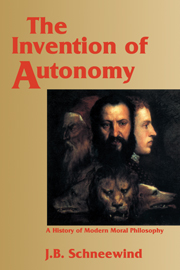Book contents
- Frontmatter
- Contents
- Preface
- Acknowledgments
- A note on references and abbreviations
- Introduction
- Part I The rise and fall of modern natural law
- 2 Natural law: From intellectualism to voluntarism
- 3 Setting religion aside: Republicanism and skepticism
- 4 Natural law restated: Suarez and Grotius
- 5 Grotianism at the limit: Hobbes
- 6 A morality of love: Cumberland
- 7 The central synthesis: Pufendorf
- 8 The collapse of modern natural law: Locke and Thomasius
- Part II Perfectionism and rationality
- Part III Toward a world on its own
- Part IV Autonomy and divine order
- Epilogue
- Bibliography
- Index of names
- Index of subjects
- Index of biblical citations
8 - The collapse of modern natural law: Locke and Thomasius
Published online by Cambridge University Press: 05 June 2012
- Frontmatter
- Contents
- Preface
- Acknowledgments
- A note on references and abbreviations
- Introduction
- Part I The rise and fall of modern natural law
- 2 Natural law: From intellectualism to voluntarism
- 3 Setting religion aside: Republicanism and skepticism
- 4 Natural law restated: Suarez and Grotius
- 5 Grotianism at the limit: Hobbes
- 6 A morality of love: Cumberland
- 7 The central synthesis: Pufendorf
- 8 The collapse of modern natural law: Locke and Thomasius
- Part II Perfectionism and rationality
- Part III Toward a world on its own
- Part IV Autonomy and divine order
- Epilogue
- Bibliography
- Index of names
- Index of subjects
- Index of biblical citations
Summary
Barbeyrac tells us that Bacon was a major influence on Grotius, and Cumberland claims that his own work answers Bacon's call for empirical investigation of morals. We have seen how important the empiricist outlook was for both Grotius and Cumberland; but Bacon held views that neither would have accepted. In his “Confession of Faith” he declared his belief
that God created Man in his own image … that he gave him a law and commandment … that man made a total defection from God, presuming to imagine that the commandments and prohibitions of God were not the rules of Good and Evil, but that Good and Evil had their own principles and beginnings; and lusted after the knowledge of those imagined beginnings, to the end to depend no more upon God's will revealed, but upon himself and his light, as a God; than the which there could not be a sin more opposite to the whole law of God.
Bacon was not alone in combining empiricism, voluntarism, and the belief that pride is what moves us to insist that we must be able to understand God's commands by our own lights. Pufendorf's system presents the fullest modern exposition of the implications for morality of a view like this, and Locke recommended Pufendorf's work for the education of any gentleman's son.
- Type
- Chapter
- Information
- The Invention of AutonomyA History of Modern Moral Philosophy, pp. 141 - 166Publisher: Cambridge University PressPrint publication year: 1997



